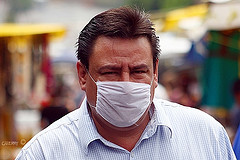 According to the CDC, 20% of all travelers get sick on their trips and about 5% of those require emergency medical care when traveling abroad. According to the WHO, tourists are 10 times more likely to die as a result of an injury – and 23% of tourist deaths are caused by injuries.
According to the CDC, 20% of all travelers get sick on their trips and about 5% of those require emergency medical care when traveling abroad. According to the WHO, tourists are 10 times more likely to die as a result of an injury – and 23% of tourist deaths are caused by injuries.
Even travel to relatively tame parts of the world can result in horrendous medical care costs if you catch a virus or get hurt.
See this pre-travel health checklist to be better prepared on your next trip.
1. Research your destination
Before you travel, you can get country-specific information, such as security alerts, current threats to safety, and more, by selecting your destination here: https://travel.state.gov/travel/travel_1744.html.
You can also learn about current weather and health risks for your destination here:
- Centers for Disease Control and Prevention Travel Notices
- World Health Organization Disease Outbreak News
In researching your destination, it’s critical to discover whether vaccinations are recommended and whether you need to carry anti-malarial medication, for example.
2. Check your health insurance plan
You cannot assume your health insurance will go along with you when you travel, so it’s critical to find out before you leave.
While a few health plans provide some coverage abroad, it’s more likely that you’ll have to pre-pay for your medical care. Many travel insurance plans, like Medicare, do not cover travelers outside the U.S. borders.
Call your health insurance provider and ask specifically whether you will have coverage in the country you plan to visit. If not, see #9.
3. Know your options for medical care
Finding reliable and qualified medical care while traveling, particularly if you don’t know the local language, can be a risky venture. Most travel experts recommend having travel medical insurance and becoming a member of IAMAT.
With travel insurance, you’ll have help locating local medical providers and arranging for emergency transportation.
IAMAT members have online access to qualified, affiliated doctors and clinics in over 90 countries – and participants are fluent in English.
4. Know how the government can assist
If you become seriously ill or are injured abroad, the local consular officer can help by informing family and friends of your condition, but it’s not the government’s responsibility to get you home.
If an overseas crisis occurs, and you have enrolled in the Smart Traveler Enrollment Program (STEP), then the U.S. State Department will send you updated security information.
If the State Department recommends evacuation and no commercial transportation is available, they may arrange for citizens to be transported out of the crisis zone. Those costs are paid for by the travelers.
5. Check your evacuation options
Just as many health insurance plans do not provide coverage overseas, neither do they pay for medical evacuations back to the U.S. Read how one couple was refused medical treatment in the Bahamas and had to get donations to get home.
A medical evacuation can cost tens of thousands of dollars depending on your location and your medical condition.
It’s not likely that you’ll have evacuation coverage with your credit card travel protection either, so your safest bet is to have evacuation coverage with your travel insurance plan.
6. See a doctor before you travel
Before you travel overseas, it’s a good idea to see a doctor 4 to 6 weeks before your trip to update your vaccinations, check your health, and to protect yourself if you have a pre-existing medical condition.
Your doctor will also be able to tell you which medications to take along to fight illnesses you may encounter on your trip.
7. Check your health status
The rapid spread of the 2009 pandemic influenza A (H1N1) was significantly aided by infected travelers – those who were symptomatic and those who were experiencing the incubation stage.
Aided by travelers, this new virus found its way into dozens of countries in less than 2 months after it was identified.
No one wants to cancel a trip, but there are times when it’s recommended.
8. Sort out your medications
Make sure you have enough medication to last through your trip and pack these in your carry-on luggage. Keep medicines in their original containers as it will cause less trouble when going through customs.
9. Purchase travel insurance
Now that you know the risks and your coverage, you are in a better position to select a plan based on your needs and purchase the right travel insurance to cover your trip.
